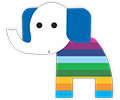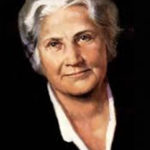Dr Maria Montessori (1870-1952)
WHAT IS MONTESSORI?
Over one hundred years ago, Dr. Maria Montessori discovered that children are born with a profound desire to interact with their environment in an intelligent way. She found that children flourished when they were left free to direct their own learning, within a prepared environment.
She pioneered a radical approach to education based on the scientific study of how children grow and learn, and the design of living and learning environments that meet their changing developmental needs.
Montessori Methodology
Montessori Method and philosophy were developed by the first woman physician in Italy, Maria Montessori, who was born in 1870. She was not only a physician, but a lecturer, educator and innovator. She worked in the fields of psychiatry and anthropology.
Dr Montessori developed the Montessori Philosophy and method of education using a scientific approach to how the human brain developed, closely observing children at varied stages of development from birth to adulthood. She observed that children under six absorb limitlessly and effortlessly from the world around them and in doing so lay down all the foundations for later life.
She is highly acclaimed for her theories on the central idea of freedom for the child, nurtured through the use of mind and body within a carefully planned environment. In a method of education that is based on self-directed activity, hands-on learning and collaborative play.
In a Montessori classroom, the children make creative choices in their learning and are encouraged to independently select work that will interest and challenge them. Every piece of work placed in the classroom is designed to aid in some facet of their development.
A primary role of the teacher in a Montessori classroom is to observe the working of the children making sure that they are selecting work that is appropriate and challenging for their stage of development. Children work in groups and individually to discover and explore knowledge of the world. Above all, Montessori classrooms at all levels nurture each child’s individual strengths and interest.
Montessori education does not simply educate children to accomplish specific tasks but rather educates them for life. It is also considered to be an extension of the home, where parent and teacher work together in guiding the child in cognitive, social, physical, emotional and spiritual development.







